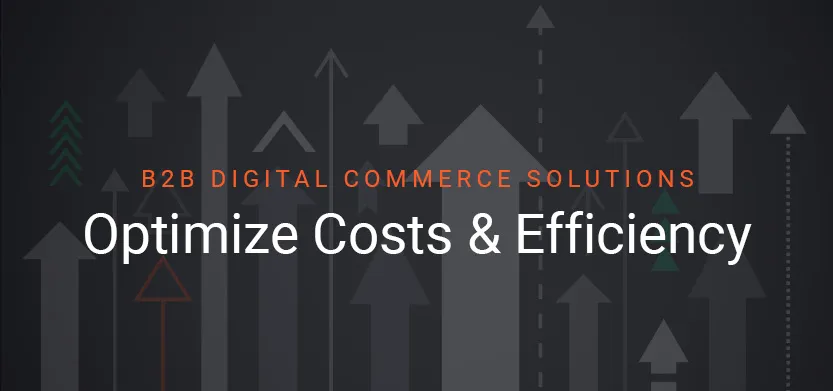B2B digital commerce solutions optimize costs & efficiency
Business leaders that want to stay ahead of the competition and achieve their business goals should consider using B2B digital commerce assets to their advantage. In this article, we will briefly touch on how those assets can optimize costs and produce efficiencies, company-wide.
How digital commerce solutions can optimize B2B organizations
- Reducing costs
- Order automation: taking manual processes out of orders removes potential errors.
- Reduced cost of service: automating order-taking frees employees up for other tasks.
- Improved pricing accuracy: automated ordering based on account parameters leads to fewer pricing discrepancies.
- Increasing efficiency and improving customer experience
- Improved customer expectations for product delivery: with an integrated system, digital commerce solutions can provide real-time information to clients.
- Improved order transparency: by logging into their account, clients can see their order process in real-time, avoiding the hassle of calling sales reps to find out when orders would be shipped.
- Reordering simplified: most B2B orders are replenishment and do not require the intervention of a sales rep. When a client can place a reorder on their own, it improves the experience dramatically.
As discussed in our previous articles, the B2B buyer persona has changed. Online ordering is no longer just a nice option for B2B companies; digital commerce is absolutely necessary. The way people shop in their private lives had to change, and now they expect to see that change happen in their business purchasing. Organizations that do not provide online commerce options will find sales dropping as competitors adopt digital solutions.
The time to adopt those solutions is now. B2B businesses have had to adopt new technology five to ten years ahead of schedule to meet their buyer’s expectations and move away from manual processes and antiquated business systems. Competitive advantage no longer lies in your product but in operational process improvements and superior digital experience.
Companies must foster these shifts for buyers and sellers with digital commerce solutions. Without an effective deployment of digital commerce solutions to support these changes in behaviour, B2B organizations risk a poor user experience for buyers and an increase in digital friction within their internal teams.
Reducing costs with digital commerce
“By 2023, B2B organizations with digital commerce offerings will see a 20% reduction in costs, compared to competitors without B2B digital commerce sites.” - Gartner, Leverage B2B Digital Commerce for Cost Optimization, Improved CX and Revenue Growth
Order automation
Manual order processes are prone to error, on the part of the buyer, or the salesperson. Building a digital commerce site to process orders can minimize the costs associated with mistakes by implementing automatic order checks, related product suggestions and quantity minimum or maximum thresholds.
Reduced cost of service
By removing the manual labour out of the ordering process, employees are freed up to focus on customer questions, service and experience, and orders can flow directly into order management systems for processing.
Improved pricing accuracy
Integrating a B2B digital commerce site with an ERP system allows for the platform to pull contract-specific pricing for each individual account, or automatically assign pricing based on segments and other factors. This leads to fewer pricing discrepancies between buyers and sales reps, and can also prevent sales agents from accidentally misquoting a price and charging too little, resulting in lost revenue. B2B digital commerce sites also provide an opportunity for B2B sellers to adopt price optimization tools in order to maximize revenue and margins.
Increasing efficiency and improving customer experience with digital commerce
Improved customer expectations for product delivery
Integrating digital commerce platforms with other operational systems can allow B2B organizations to offer estimated shipping and receipt times based on inventory, knowledge of current processing times and insight into potential shipping delays.
Improved order transparency
B2B digital commerce sites can provide “order status” links that pull data from ERPs or data management systems, providing accurate status for in-process orders. Without a site to return to for order status, customers are forced to place additional phone calls or send follow-up emails, increasing frustration for the buyer and support costs for the seller. The transparency underpinning B2B digital commerce extends beyond the order status to pricing, promotions, approvals and quotes.
Reordering simplified
Many B2B orders are either replenishment orders or orders that do not need a significant amount of product discovery and research. Some B2B buyers place the same order for the same products, with the same quantity, every month. B2B digital commerce sites make this process especially simple, with functionality such as saved purchase lists or shopping carts, CSV (comma-separated values) or Excel uploads, or simple functionality for viewing and duplicating previous orders. This is a simple process for buyers, but greater simplicity also results in timely reorders, which results in more revenue for sellers.
Creating self-service digital commerce options for B2B has the net effect of shortening the sales cycle with easier, more efficient buying processes. Buyers are no longer subjected to the inefficiency of contacting a sales rep or filling out an order form. They can simply order what they need, as needed. Sales teams can also reap the benefits of automated processes, reducing the time and energy spent generating quotes and building deals; the right digital commerce platform with the right automation tools can help create those in the blink of an eye.
If your B2B organization is ready to start a new digital commerce journey and needs integration or a hand with workflow automation, reach out to our specialists. We are here to help, even if that help is in the form of an unbiased ear and some sage insight.


